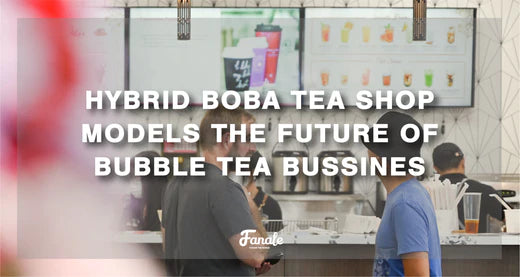Boba tea, also known as bubble tea, has become a popular drink around the world in recent years. The combination of sweet tea, chewy tapioca pearls, and a variety of flavors has made it a favorite among young people and tea lovers alike. As the demand for boba tea continues to grow, many entrepreneurs are starting to consider opening their own boba tea shops. However, with the ongoing COVID-19 pandemic, traditional brick-and-mortar boba tea shops have been struggling to survive. In this blog post, we will explore the future of boba tea shops and how a hybrid model can help them thrive in the current market.
A hybrid boba tea shop is a business that combines both online and offline elements. This can include having an online store where customers can place their orders and have them delivered, as well as a physical storefront where customers can come and enjoy their drinks. This model allows boba tea shops to reach a wider audience, as well as provide a more convenient experience for customers.
One of the main advantages of a hybrid boba tea shop is the ability to reach more customers. By having an online store, boba tea shops can reach customers who may not live near their physical location. This can include people who are traveling, as well as those who live in areas without a boba tea shop nearby. Additionally, an online store allows boba tea shops to reach customers who may not have the time or ability to visit a physical storefront.
Another advantage of a hybrid boba tea shop is the ability to provide a more convenient experience for customers. By having an online store, customers can place their orders and have them delivered to their home or office. This eliminates the need to wait in line or worry about parking, making the boba tea experience more convenient. Additionally, an online store allows customers to place their orders in advance, ensuring that their drinks will be ready when they arrive.
In addition to the above advantages, a hybrid boba tea shop also allows for better inventory management. By having both an online store and a physical storefront, boba tea shops can better track their inventory and ensure that they always have the ingredients and supplies needed to make their drinks. Additionally, by having an online store, boba tea shops can also track customer demand and adjust their inventory accordingly.
While a hybrid boba tea shop model has many advantages, it does come with its own set of challenges. One of the main challenges is the cost of setting up and maintaining an online store. This can include the cost of website development, as well as ongoing expenses such as hosting and security. Additionally, boba tea shops will need to ensure that their online store is user-friendly and easy to navigate, as well as secure to protect customer information.
Another challenge of a hybrid boba tea shop is the need for efficient logistics and delivery. This can include ensuring that orders are delivered on time, as well as ensuring that the drinks are kept at the proper temperature during delivery. Additionally, boba tea shops will need to ensure that they have the proper packaging and insulation to keep the drinks fresh during delivery.
In conclusion, a hybrid boba tea shop model is the future of boba tea shops. By combining both online and offline elements, boba tea shops can reach a wider audience, provide a more convenient experience for customers, and better manage their inventory. While there are challenges to implementing this model, the advantages outweigh the disadvantages. As the demand for boba tea continues to grow, more and more entrepreneurs will start to consider opening their own boba tea shops, and a hybrid model can help them thrive in the current market.



